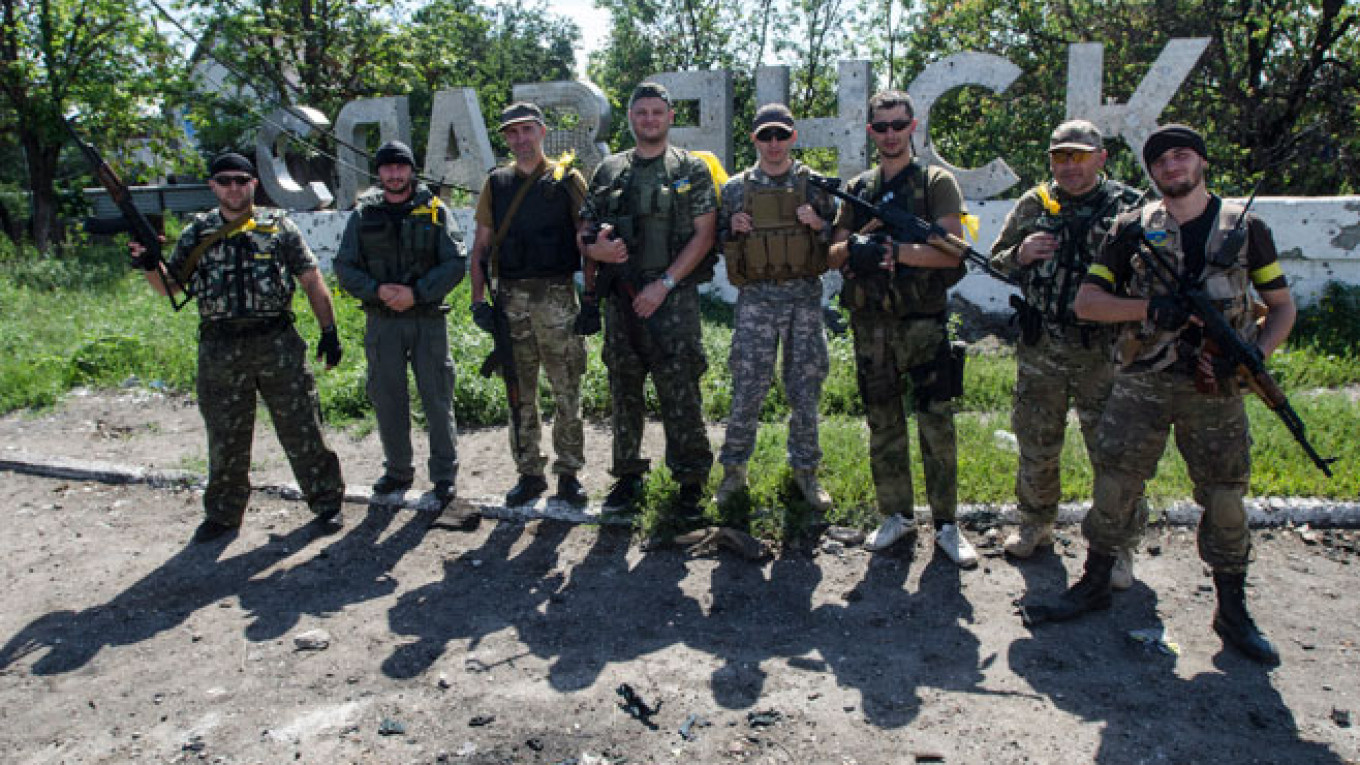KIEV/DONETSK, Ukraine — Ukrainian forces regained more ground but sustained further casualties Thursday in clashes with separatists, while two Western allies urged President Vladimir Putin to exert more pressure on the rebels to find a negotiated end to the conflict. Government forces have recently gained the upper hand in the three-month conflict against separatists in the Russian-speaking eastern regions in which more than 200 government troops have been killed as well as hundreds of civilians and rebel fighters.
The Ukrainian military says it has a plan to deliver a "nasty surprise" to the heavily armed separatists who have dug in in Donetsk, a city of 900,000 people, after being pushed out of their bastion in Slovyansk at the weekend.
In a further success, military spokesman Vladyslav Seleznyov said government forces on Thursday re-took the town of Siversk, east of Slovyansk, when separatists fled. A separatist confirmed the government's version, saying it was "more or less correct."
"There was no sense in holding it and reinforcing it [Siversk] because there was a big risk of being encircled."
But casualties mounted on the Ukrainian side with the deaths of three more Ukrainian soldiers in two attacks on Wednesday night in different parts of the east, the military said. One was killed in an ambush of a military convoy near Luhansk, while two others died when an armored personnel carrier was blown up by a landmine in the village of Chervona Zorya near Donetsk.
Government forces guarding Donetsk's main international airport, the scene of bitter fighting in late May, came under mortar fire Thursday but the rebel attack was repelled, Seleznyov said. In further international diplomacy to end the worst Russia-West crisis since the Cold War, French President Francois Hollande and German Chancellor Angela Merkel urged Putin by telephone to "exert all necessary pressure on the separatists to bring them to negotiate effectively," an Elysee Palace statement said.
They also asked him to use his influence to take concrete steps to ensure control of the border where, the Kiev government says, Russian authorities have been turning a blind eye to fighters crossing with weapons and equipment to help the rebels.
Moscow is under sanctions by the U.S. and the European Union over the Ukraine crisis but denies it is supporting the rebels in the Russian-speaking east of Ukraine.
Russia on Thursday condemned an EU plan to extend the list of persons, including Russians, targeted with asset freezes and travel bans as an unfriendly move that would hinder ties with the 28-nation bloc.
The EU has agreed to add 11 new names to the list likely to take effect on Saturday, an EU diplomat said Wednesday.
Ukraine's border guard service reported that six Russian helicopters had flown some distance over the border into Ukraine on Wednesday and then returned home in what it described as "direct provocations in support of the terrorists."
In its version of the three-way telephone call, the Kremlin said the three leaders had agreed on the need for a "swift renewal" of the cease-fire and another round of peace talks involving the "contact group" and separatist leaders.
Ukrainian President Petro Poroshenko refused to prolong a 10-day unilateral cease-fire when it expired on June 30 and ordered a resumption of the military offensive against the rebels resulting in Slovyansk being retaken at the weekend.
His security chiefs say the rebels repeatedly breached the government's unilateral cease-fire, resulting in many Ukrainian military deaths, and have ruled out any more such truces until the rebels lay down their arms.
Rebels in Donetsk, commanded by a Russian military adventurer called Igor Girkin or Strelkov, say they are recruiting new fighters to resist government forces despite now being without help from Russia. Buoyed by the success in Slovyansk, Ukrainian security officials say they have a plan ready to crush the rebels in Donetsk, though Poroshenko has ruled out air strikes and artillery bombardment because of the large civilian population.
The separatists are occupying administrative buildings in both Donetsk and Luhansk and are dug in on the outskirts of Donetsk.
Thousands of people have fled Donetsk, a major industrial hub and Euro-2012 football site, since the onset of the conflict, and many businesses are closing down. With armed men out on the streets, tension is growing in the city. Several social groups came together Thursday to call on townspeople to join in a daily prayer session at noon everyday from next Monday.
A Message from The Moscow Times:
Dear readers,
We are facing unprecedented challenges. Russia's Prosecutor General's Office has designated The Moscow Times as an "undesirable" organization, criminalizing our work and putting our staff at risk of prosecution. This follows our earlier unjust labeling as a "foreign agent."
These actions are direct attempts to silence independent journalism in Russia. The authorities claim our work "discredits the decisions of the Russian leadership." We see things differently: we strive to provide accurate, unbiased reporting on Russia.
We, the journalists of The Moscow Times, refuse to be silenced. But to continue our work, we need your help.
Your support, no matter how small, makes a world of difference. If you can, please support us monthly starting from just $2. It's quick to set up, and every contribution makes a significant impact.
By supporting The Moscow Times, you're defending open, independent journalism in the face of repression. Thank you for standing with us.
Remind me later.






